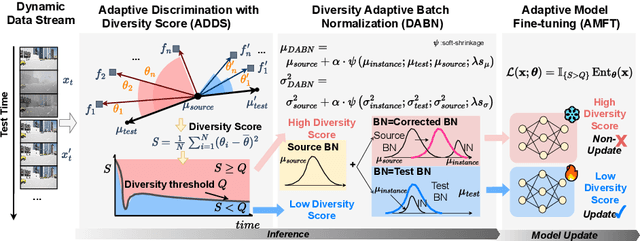Yixi Lin
DATTA: Towards Diversity Adaptive Test-Time Adaptation in Dynamic Wild World
Aug 15, 2024

Abstract:Test-time adaptation (TTA) effectively addresses distribution shifts between training and testing data by adjusting models on test samples, which is crucial for improving model inference in real-world applications. However, traditional TTA methods typically follow a fixed pattern to address the dynamic data patterns (low-diversity or high-diversity patterns) often leading to performance degradation and consequently a decline in Quality of Experience (QoE). The primary issues we observed are:Different scenarios require different normalization methods (e.g., Instance Normalization is optimal in mixed domains but not in static domains). Model fine-tuning can potentially harm the model and waste time.Hence, it is crucial to design strategies for effectively measuring and managing distribution diversity to minimize its negative impact on model performance. Based on these observations, this paper proposes a new general method, named Diversity Adaptive Test-Time Adaptation (DATTA), aimed at improving QoE. DATTA dynamically selects the best batch normalization methods and fine-tuning strategies by leveraging the Diversity Score to differentiate between high and low diversity score batches. It features three key components: Diversity Discrimination (DD) to assess batch diversity, Diversity Adaptive Batch Normalization (DABN) to tailor normalization methods based on DD insights, and Diversity Adaptive Fine-Tuning (DAFT) to selectively fine-tune the model. Experimental results show that our method achieves up to a 21% increase in accuracy compared to state-of-the-art methodologies, indicating that our method maintains good model performance while demonstrating its robustness. Our code will be released soon.
 Add to Chrome
Add to Chrome Add to Firefox
Add to Firefox Add to Edge
Add to Edge